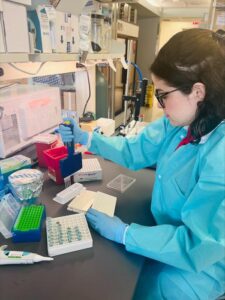Antibodies for Zika virus, a mosquito-borne virus that spread to the Americas in 2015 and still causes sporadic disease, can be confused in many diagnostic tests with antibodies for dengue virus, making it difficult to tell if someone who tests positive previously had dengue, Zika, or both. It is especially important for reproductive-age women to know if they already had Zika—and likely have immunity—because infection during pregnancy can cause birth defects.
“If you go to places like Brazil, nearly everybody is going to have some immunity to dengue, and also to Zika,” said first author Priscila Castanha, PhD, an assistant professor in the department of infectious disease and microbiology at Pitt Public Health. “This makes it very difficult to test new treatments or determine how widespread an emerging disease may be in areas endemic for flaviviruses, which cause a high burden of illness globally.”

The research team used an approach pioneered by Thomas Kodadek, PhD, professor of chemistry at the Wertheim University of Florida Scripps Institute to screen half a million “peptide-inspired conformationally constrained oligomers,” or PICCOs, against blood samples from people infected with dengue or Zika virus. PICCOs, which are attached to microscopic plastic beads, mimic epitopes of a pathogen.
This research was published in PNAS in the paper, “Identification and characterization of a nonbiological small-molecular mimic of a Zika virus conformational neutralizing epitope.”
The researchers identified 40 PICCOs that engaged Zika virus antibodies. After screening against dengue-positive blood, one PICCO, dubbed CZV1-1, was specific to Zika antibodies. This single CZV1-1 PICCO synthetic molecule correctly identified people previously infected with Zika virus 85.3% of the time and generated false positives in 1.6% of tests.
The study is the first to apply an innovative “epitope surrogate” technology to Zika. Until now, researchers and clinicians have lacked diagnostic tools to easily differentiate between prior infections with different flaviviruses, a family of mostly mosquito- and tick-borne viruses that include Zika and dengue. This has posed challenges for clinical-epidemiologic studies, viral diagnostics, and vaccine development.

This research team has been studying Zika virus since it emerged in the Americas in 2015. Prior to its emergence in Brazil, they were studying dengue virus. “For every sample we tested during the 2015 outbreak, we had to do 10 different blood tests to confirm Zika,” said Castanha. “These tests are technically difficult and time-consuming, making them impractical for providing clinical guidance. I think if we had this molecule back then, it would’ve been fantastic.”
Importantly, the PICCO screening technology used to identify the Zika-specific molecule doesn’t require refrigeration and could also be used for other outbreaks. “The molecule is a molecular mimic that cannot unfold,” Kodadek said. “That means there’s no cold chain required, making it particularly useful for outbreaks occurring in remote or low-resourced areas.”


